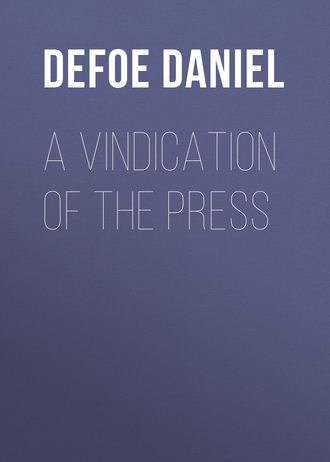
Даниэль Дефо
A Vindication of the Press
The Question first ask'd is, whether an Author is a Whig or a Tory; if he be a Whig, or that Party which is in Power, his Praise is resounded, he's presently cried up for an excellent Writer; if not, he's mark'd as a Scoundrel, a perpetual Gloom hangs over his Head; if he was Master of the sublime Thoughts of Addison, the easy flowing Numbers of Pope, the fine Humour of Garth, the beautiful Language of Rowe, the Perfection of Prior, the Dialogue of Congreve, and the Pastoral of Phillips, he must nevertheless submit to a mean Character, if not expect the Reputation of an Illitterate.
Writings for the Stage are of late so very much perverted by the Violence of Party, that the finest Performance, without Scandal, cannot be supported; Shakespear and Ben Johnson, were they, now living, would be wholly at a Loss in the Composure of a Play suitable to the Taste of the Town; without a promiscuous heap of Scurrility to expose a Party, or, what is more detestable, perhaps a particular Person, no Play will succeed, and the most execrable Language, in a Comedy, produc'd at this Time, shall be more applauded than the most beautiful Turns in a Love for Love: Such are the Hardships a Dramatick-Poet has to struggle with, that either Obscenity, Party, or Scandal must be his Theme, and after he has performed his utmost in either of these Ways, without a powerful Interest, he'll have more Difficulty in the bringing his Play upon the Theatre than in the Writing, and sometimes never be able to accomplish it.
These are the Inconveniencies which Writers for the Stage labour under, besides 'tis observable, that an obsequious prolifick Muse generally meets with a worse Reception than a petulant inanimate Author; and when a Poet has finished his Labours, so that he has brought his Play upon the Stage, the best Performance has oftentimes the worst Success, for which I need only instance Mr. Congreve's Way of the World, a Comedy esteem'd by most Persons capable of judging, no way inferior to any of his other Performances.
A Choice of Actors, next to Interest and Popularity, is the greatest Advantage to a new Play: If a Stage-Poet has the Misfortune not to have a sufficient Influence over the Managers of the Theatres to make a Nomination, his Performance must very much suffer; and if he cannot entirely Command his Theatre, and Season for bringing it on, it will be perfectly slaughter'd; and a certain Theatre has lately acquir'd the Name of a Slaughter-House, but whether more for the Stupidity of its Poets than its Actors, I do not pretend to determine; but certain it is, that Acting is the Life of all Dramatick-Performances. And tho' an indifferent Play may appear tolerable, with good Acting, it is impossible a bad one can afford any Entertainment, when perform'd by an incompleat Set of Comedians.
In respect to Writings in general, there is an unaccountable Caprice in abundance of Persons, to Condemn or Commend a Performance meerly by a Name. The Names of some Writers will effectually recommend, without making an Examination into the Merit of the Work; and the Names of other Persons, equally qualified for Writing, and perhaps of greater Learning than the Former, shall be sufficient to Damn it; and all this is owing either to some lucky Accident of writing apposite to the Humour of the Town, (wherein an agreeable Season and a proper Subject are chiefly to be regarded) or to Prejudice, but most commonly the Former.
It is a Misfortune to Authors both in Prose and Verse, who are reduc'd to a Necessity of constant writing for a Subsistence, that the numerous Performances, publish'd by them, cannot possibly be so correct as they might be, could more Time be afforded in the Composure. By this Means there is sometimes just room for Criticism upon the best of their Productions, and these Gentlemen, notwithstanding it be never so contrary to their Inclinations, are entirely oblig'd to prostrate their Pens to the Town, as Ladies of Pleasure do their Bodies; tho' herein, in respect to Party, it is to be observ'd, that a Bookseller and an Author may very well be allow'd occasionally to be of either Party, or at least, that they should be permitted the Liberty of Writing and Printing of either Side for Bread, free from Ignominy; and as getting Money is the chief Business of the World, so these Measures cannot by any means be esteem'd Unjust or Disreputable, with regard to the several Ways of accumulating Wealth, introduc'd in Exchange-Alley, and at the other End of the Town.
It is a common Practice with some Persons in the World, either to prefix the Name of a Mecanas in the Front of their Performances, or to obtain recommendatory Lines from some Person of excellency in Writing, as a Protection against Criticism; and there is nothing more frequent than to see a mean Performance (especially if it be done by a Man of Figure) with this Guard.
'Tis true, the worst Performances have the greatest occasion of these Ramparts, but then the Person who takes upon him to Recommend, must have such an absolute Authority and Influence over the generality of Mankind, as to silence all Objections, or else it will have a contrary Turn, by promoting a Criticism as well upon the Author as upon himself; for which Reason it is very hazardous for a Person in a middle Station (tho' he have never so great a Reputation in Writing) to engage in the Recommendation of the Writings of others.
The severe Treatment which the brightest Men of the Age have met with from the Criticks, is sufficient to deter all young Gentlemen from entring the Lists of Writing; and was not the World in general more good-natur'd and favourable to youthful Performances than the Criticks, there would be no such thing as a Succession of Writings; whereas, by that Means, and his present Majesty's Encouragement, Literature is in a flourishing Condition, and Poetry seems to improve more at this Time than it has done in any preceding Reign, except that of King Charles II. when there was a Rochester, a Sidley, a Buckingham, &c. And (setting aside Party) what the World may hope from a generous Encouragement of polite Writing, I take to be very conspicuous from Mr. Pope's Translation of Homer, notwithstanding the malicious and violent Criticisms of a certain Gentleman in its Disfavour.
In the religious Controversy of late depending, Criticisms have been carried to that height, that some Persons have pretended to fix false Grammer on one of the most celebrated Writers perhaps at this Time in Europe, but how justly, I leave to the Determination of those who have perused the Bishop's incomparable Answer; but admitting his Lordship had permitted an irregularity of Grammer to pass unobser'd [typo for "unobserv'd"?], he is not the first of his Sacred Character that has done it, and small Errors of this kind are easily looked over, where the Nominative Case is at a distance from the Verb, or a Performance is done in haste, the Case of the Bishop against so many powerful Adversaries. Besides, it is apparent and well known, that a certain Person [Mr. Lessey, now with the Chevalier.] in the World, who has a very great Reputation in Writing, never regards the strict Rules of Grammer in any of his Performances.
It is a Satisfaction to Authors of tender Date, to see their Superiors thus roughly handled by the Criticks; a young Writer in Divinity will not think his Case desperate, when the shining Bangor has met with such malevolent Treatment; neither must a youthful Poet be uneasy at a severe Criticism, when the Great Mr. Addison, Rowe and Pope have been treated with the utmost Scurrility.
These Men of Eminence sitting easy with a load of Calumny, is a sufficient Consolation to Inferiors under the most despicable Usage, and there is this satisfactory Reflection, that perhaps the most perfect Work that ever was compos'd, if not so entirely correct, but there may be some room for Criticism by a Man of consummate Learning; for there is nothing more common than to find a Man, (if not wholly blind) over opiniated in respect to his own Performances, and too exact in a Scrutiny into the Writings of others.
The ill Nature attending Criticism I take to be greater now than in any Age past; a Man's Defects in Writing shall not only be expos'd, but all the personal Infamy heap'd upon him that is possible; his Descent and Education shall be scandaliz'd, (as if a fine Performance was the worse for the Author's Parentage) his good Name villified, a History of the Transactions of his whole Life, and oftentimes a great deal more, shall be written, as if the were a Candidate setting up in a Burough for Member of Parliament, not an airy[?] or loose Action shall be omitted, and neither the Sacred Gown, nor the greatest Dignity shall be exempted; but there is this Consideration which sways the sensible part of Mankind, viz. a Man of Excellency in Writing his being generally a Person of more Vivacity than the common Herd, and consequently the more extraordinary Actions in him are allowable; yet, nevertheless, I think it consistent with Prudence for an Author, when he has the good fortune to compose a Piece, which he's assur'd will occasion Envy and Criticism, to write his own Life at the same Time with it, tho' it be a little extravagant and the method is unusual, to prevent an ill-natur'd doing thereof by the Hand of another Person.
According to the old Maxim, Get a Reputation, and lye a Bed, not to mention how many lye a Bed before they can attain it, according to the humorous Turn of the late ingenious Mr. Farqubar; but there's at this Time a greater necessity for a Man to be wakeful, when he has acquir'd a Reputation, than at any Time before; he'll find abundantly more difficulty attend the Securing than the Attaining of the greatest Reputation; he'll meet with Envy from every Quarter; Malice will pursue him in all his undertakings, and if he makes any manner of Defence, he cannot commence it too soon, tho' it is not always prudential to shew an open Resentment, even to the utmost ill Treatment.
If a Man be so considerable as to be thought worthy of Criticism, a luducrous Reprimand is always preferable to a serious Answer; returning Scurrility with Comic-Satyr will gaul an ill-natur'd Adversary beyond any Treatment whatsoever; his Spleen will encrease equal to any Poison, his Rage keep within no Bounds, and at length his Passion will not only destroy his own Performance, but himself likewise: And this I take to be natural in our modern Criticks.







